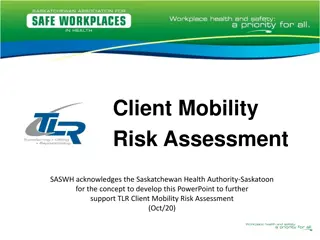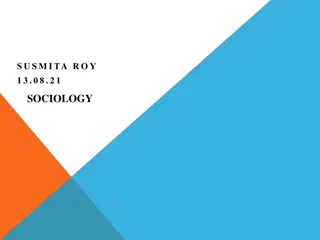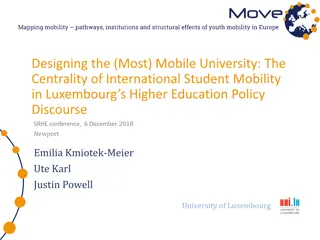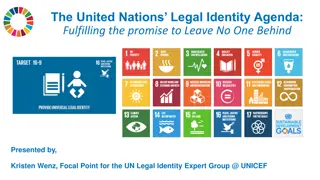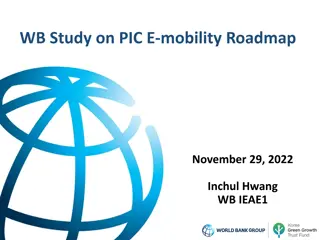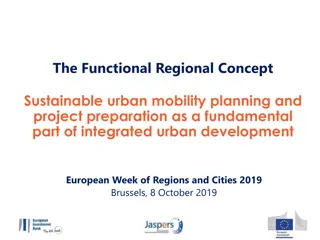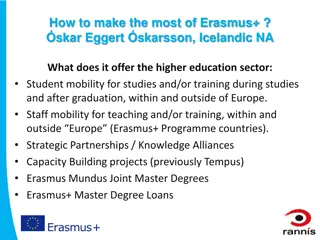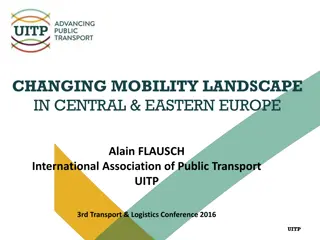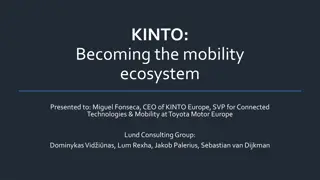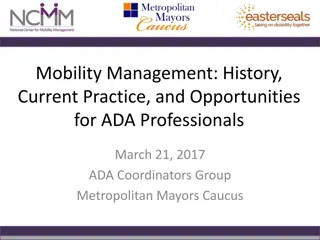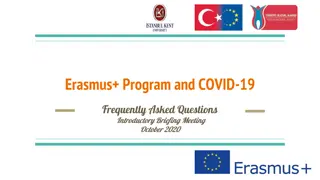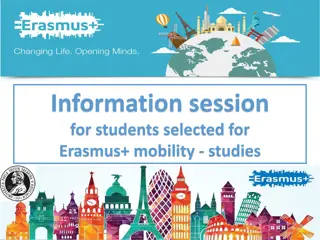Global Mobility and Legal Identity Strategy Presentation
Explore the significance of legal identity and global mobility in the context of migration and border management as presented by Mme. Mariama Mohamed Cisse, Director at IOM Special Liaison Office to the AU and ECA. The presentation addresses frameworks, principles, and strategies for ensuring legal identity for mobile populations, highlighting the impact on access to services and rights, safer migration, and development outcomes. Emphasizing the importance of legal identity for migrants, the content underscores the role of identity in facilitating essential services and rights, while mitigating risks associated with irregular migration. The presentation also aligns with Agenda 2030's commitment to inclusivity and leaving no one behind across migratory routes.
Download Presentation

Please find below an Image/Link to download the presentation.
The content on the website is provided AS IS for your information and personal use only. It may not be sold, licensed, or shared on other websites without obtaining consent from the author. Download presentation by click this link. If you encounter any issues during the download, it is possible that the publisher has removed the file from their server.
E N D
Presentation Transcript
I m m i g ra t i o n a n d B o rd e r M a n a g e m e nt D i v i s i o n IOM Institutional Legal Identity Strategy: Global Mobility Presentation by: Mme Mariama Mohamed Cisse, Director IOM Special Liaison Office to the AU and ECA
Outline Outline LI Frameworks Definition Legal identity Legal identity Legal identity for mobile populations LI Strategy: Principles, Population Categories and Pillars Capacity Development Tools UNLIA Next steps Key Recommendations
LEGAL IDENTITY GLOBAL AND REGIONAL FRAMEWORKS ACHPR ACRWC
UN Operational Definition of Legal Identity Legal identity is defined as the basic characteristics of an individual's identity. e.g. name, sex, place and date of birth conferred through registration and the issuance of a certificate by an authorized civil registration authority following the occurrence of birth. In the absence of birth registration, legal identity may be conferred by a legally-recognized identification authority. This system should be linked to the civil registration system to ensure a holistic approach to legal identity from birth to death. Legal identity is retired by the issuance of a death certificate by the civil registration authority upon registration of death.
Legal Identity for migrants and mobile populations Currently, an estimated 1.1 billion people worldwide of which 50% is within Africa, cannot officially prove their legal identity, impeding them from accessing services. Reliable access to services depends on proof of legal identity. Making access to legal identity and thus to basic services and essential rights easier for more people can play an important role in improving development outcomes and safer migration. Lacking proof of legal identity is particularly concerning for people on the move. People without this essential identifier are more susceptible to risky, irregular migration often at the hands of human traffickers and criminal smuggling groups. Equally, lack of proof of identity will result in the inability to return, integration in the host or departure country, family reunification, readmission, and reintegration. The overarching pledge of Agenda 2030 leave no one behind , depends on counting all people, including along the mobility continuum/migratory routes.
Legal Identity Strategy - Principles Equality and non-discrimination Nobody may be discriminated against (in law or in practice) on the basis of their age, origin, nationality, ethnicity, language, religion, beliefs, opinions, political activity, trade union activity, family relationships, state of health, disabilities, sexual orientation, sex or other personal characteristics People-centered IOM promotes and works to protect the dignity, well-being and rights of the populations and individuals it serves and keeps them at the center of its activities and approaches, in accordance with its mandate Rights Based approach IOM work on legal identity will be rights-based in that it will respect the human rights and other rights of migrants in all its endeavors linked to legal identity Do no harm With the view to upholding the human dignity and well-being of migrants, programming on legal identity will be subject to context analysis to avoid exposing migrants and other affected communities to additional risks Protection of privacy and personal data IOM can support States in the development of statewide computerized national legal identity systems that respect the right to privacy and align with international, regional and national data protection law and standards
Legal Identity Strategy - Population Categories This Strategy focuses on legal identity affecting four population categories: Nationals in their countries who need registered legal identity to access regular migration or travel abroad Migrants in foreign countries who require access to civil registration in the host country and in the country of origin Vulnerable mobile populations, inclusive of displaced persons and victims of trafficking, for whom legal identity intersects with protection concerns and international humanitarian law Irregular migrants for whom determining legal identity is linked to a specific country situation
Legal Identity Strategy- Four Pillars 1. Supporting development of consular civil registration, citizenship certificates, ID and travel document issuance services 2. Assisting migrants without proof of legal identity 3. Supporting national civil registration and identity management systems to facilitate regular migration and mobility 4. displacement, and legal identity including their impact on the protection of migrants Provide thought leadership on the nexus between migration,
IOM LEGAL IDENTITY STRATEGY CAPACITY DEVELOPMENT TOOLS LI Toolkit LI Master Class (formative) LI Roadshows (informative) ID Management Master Class LI Assessment questionnaire Free Movement Zones Guide for Issuance and Border Management Essentials on Documentation Access for Migrants Without Proof of Legal Identity Movement Zones Guide for Issuance and Border Management
ACHIEVEMENTS Legal Identity Interventions Chad Cameroon Libya Mozambique Niger
Whole-UN-approach with MS Develop capacity development tools Develop Guidance Material Conduct workshops and field assessments Multi Partner Trust Fund Human rights-based approach Data privacy / protection Regional Legal Identity Conferences What s What s next? next?
Key Recommendations (1) Increased Political Commitment Member States to increase their political commitment to legal identity and to prioritize resources towards the strengthening of relevant technical expertise in Civil Registration and Legal Identity systems. (2) Inclusive and effective legal identity management Call on Member States to enhance interoperability based on the development of global trust frameworks to ensure a strong legal basis and authentication systems, protection of personal data and privacy including data minimization principles, migrant friendly processes and technology including clear and accessible information in multiple languages, mobile registration, evidence-based measures derived from up-to date scientific knowledge with a strong overall focus on migrants in vulnerable situations. (3) Foster human mobility and regional integration Promote safe orderly and regular migration including through reinforcement of identification documents and enhance preparedness to domesticate continental integration agendas such as the Free Movement of Persons Protocol and the African Continental Free Trade Area Agreement







